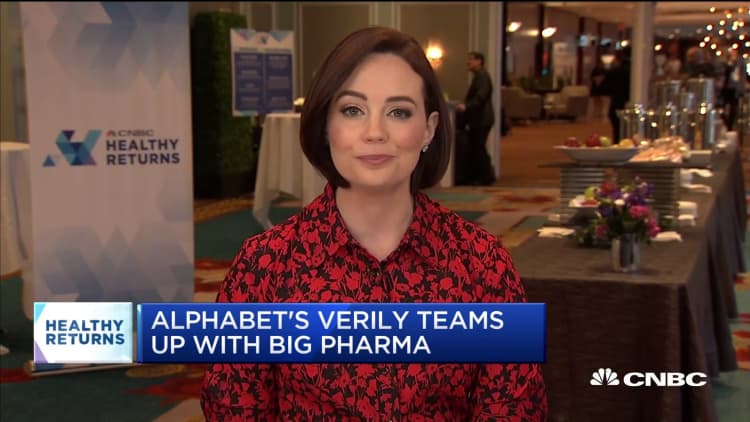Verily, the health and life sciences company under Google parent-company Alphabet, is moving into the clinical trials space.
The company announced Tuesday strategic alliances with the pharmaceutical companies Novartis, Sanofi, Otsuka and Pfizer to help it move more deeply into the medical studies market. The goals for Verily, and its pharma partners, are to reach patients in new ways, make it easier to enroll and participate in trials, and aggregate data across a variety of sources, including the electronic medical record or health-tracking wearable devices.

Clinical trials have historically been expensive processes that rely on outdated technologies. So pharma companies are looking to leverage the latest technologies from companies like Google to reach patients in a more targeted way and get their most promising drugs approved more quickly.
That's where Verily comes in.
"Clinical trials haven't changed much since the 1960's," acknowledged Rod MacKenzie, chief development officer at Pfizer. "We've been thinking about modernizing them for some time."
"We see Verily's technology as a way for us to reach patients and get them interested," said Badhri Srinivasan, head of global development operations at Novartis. In an interview, Srinivasan shared an example of engaging people who are already searching on Google for relief from asthma symptoms. At that point, Verily could surface an ad to suggest they enroll in its clinical trial patient registry, dubbed Baseline, and sign up for relevant asthma-related clinical trials if they chose to do so.
"From the beginning, our team on Baseline has been thinking a lot about how to bridge the gap between research and care," said Dr. Jessica Mega, Verily's chief medical officer. "And we know that it would involve working with health systems, pharma and biotech companies." The trials haven't launched yet, but Verily and its partners are exploring opportunities in cardiovascular disease, oncology, mental health, dermatology and diabetes.
Verily has raised more than $1 billion in capital, most recently in a round led by the private equity firm Silver Lake. That gives it some degree of independence from Alphabet, but also puts it under increasing pressure to find new ways to commercialize its technology, which is targeted to the health-care sector.
Lots of history with medical trials
Verily sees clinical trials as a natural area of focus, since it already has a lot of experience with medical studies. And it's a huge market opportunity, which is projected to be worth almost $69 billion by 2026, according to Grand View Research.
After it became an independent company within Alphabet in 2016, one of Verily's first initiatives was the Baseline clinical study. That study kicked off in 2017, with a goal to enroll 10,000 participants from diverse backgrounds to figure out why people transition from being generally healthy to getting sick. Those patients were given a range of new technologies and tools, including DNA tests and activity-tracking wearables.
In recent months, Verily has moved beyond the Baseline study, which involved partnerships with Duke and Stanford Medicine, to start enrolling even larger numbers of people in its "registry."
Verily's Scarlet Shore, who runs Baseline, said the company uses Google ads to find patients based on health-related searches, and suggests that they join the project. It also has partnerships with health systems and patient associations, including Mayo Clinic and University of Pittsburgh, which will help spread the word among patients who are interested in participating in medical studies.
Anyone can enroll in the registry in about 15 minutes by answering some basic survey questions about their health. From there, they can access relevant clinical studies from Verily's partners and undergo a consent process to sign up.
Shore said some patients might get paid, depending on the trial, but others are incentivized to sign up for altruistic reasons or to receive health information back from Baseline. Unlike most clinical trials, Baseline is hoping to share health data with the patient rather than keeping it under lock and key.
Health experts say that the clinical trials space is a big opportunity for Verily, if it keeps patient privacy safeguarded in the long term. What's unique about Verily's approach as a technology company is that it can incorporate data about patients' real lives, and not just how they fare in the confines of a lab or hospital. That trend, in the pharmaceutical industry, is known as "real-world evidence."
"The clinical trials marketplace and vendor space hasn't been disrupted in quite some time, said Tom Cassels, chief strategy officer for a company called Leidos, which specializes in health technology. "So the opportunity to both improve the efficacy and speed of clinical trials is attractive, and it's a huge market."



